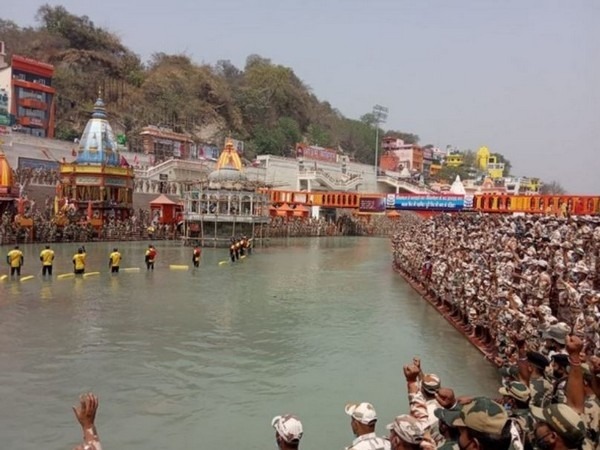The Mahakumbh, one of the largest spiritual gatherings in the world, is set to take place in Prayagraj in the northern Indian State of Uttar Pradesh, from January 13 to February 26, 2025.
The iconic event, steeped in India’s rich cultural and spiritual heritage, is expected to attract over 400 million devotees, pilgrims, and tourists from across the globe.
To ensure a safe, seamless, and spiritually enriching experience, the Indian government and the Uttar Pradesh state government have initiated extensive preparations.
The Mahakumbh is a Hindu religious festival held every 12 years at the confluence of the Ganga, Yamuna, and the mythical Saraswati Rivers in Prayagraj.
It is rooted in ancient Indian mythology, with devotees believing that a holy dip in the sacred waters during the Mahakumbh purifies the soul and liberates one from the cycle of birth and death.
Recognised by UNESCO as an “Intangible Cultural Heritage of Humanity,” the Mahakumbh is not just a religious event but also a celebration of India’s diverse cultural traditions.
Given the sheer scale of Mahakumbh 2025, the Uttar Pradesh government has embarked on massive infrastructure projects to accommodate the influx of pilgrims. Some key initiatives include:
Enhanced connectivity: Airports in Prayagraj, Varanasi, and Lucknow are being upgraded to handle increased air traffic, while new rail lines and expressways are under construction to ensure seamless connectivity.
As per reports, the renovation of 92 roads and the beautification of 17 major roads are nearing completion, and construction of 30 pontoon bridges using 3,308 pontoons is underway, while 28 are already operational.
A total of 800 multi-language signages are being installed across Prayagraj to guide visitors.
Temporary township: A sprawling temporary city with over 5,000 hectares of tent accommodations is being developed along the riverbanks, complete with modern amenities and sanitation facilities.
According to reports, Mahakumbh Nagar is being transformed into a temporary city with thousands of tents and shelters, including super deluxe accommodations like the Indian Railway Catering and Tourism Corporation’s (IRCTC) “Mahakumbh Gram” luxury tent city which offers deluxe tents and villas with modern amenities.
Smart city features: Advanced surveillance systems, LED lighting, and a robust communication network are being integrated to manage crowds efficiently and ensure safety.
Safety and security measures:
With millions of devotees expected daily, ensuring safety is a top priority.
The authorities were implementing a multi-layered security plan involving local police, paramilitary forces, and specialised disaster management units. Key measures include:
Crowd management: Advanced Artificial Intelligence (AI)-based tools will monitor crowd density and provide real-time data to manage foot traffic.
Emergency services: Fully equipped medical centres, ambulances, and mobile health units will be stationed across the festival grounds.
Fire safety: More than Rs 1310 million (17.4 million USD) have been allocated for fire safety measures. Four Articulating Water Towers (AWTs) capable of tackling fires up to 35 meters high, and 30 metres wide will be deployed.
These AWTs will be equipped with advanced technologies, including video and thermal imaging systems, to prevent fire incidents and enhance safety.
River safety: Teams of divers and lifeguards will patrol the riverbanks, and floating barriers will be installed to ensure safe bathing areas.
Underwater drones capable of diving up to 100 metres will be used for the first time at the Sangam area to provide round-the-clock surveillance.
Mahakumbh 2025 will also serve as a platform to showcase India’s spiritual diversity and cultural richness. A wide array of programmes is planned, including:
Discourses by spiritual leaders: Renowned saints and scholars will hold discourses on various aspects of Hindu philosophy and spirituality.
Cultural performances: Traditional music, dance, and drama performances will highlight the artistic heritage of India.
Exhibitions and workshops: Interactive exhibits will educate visitors on the history and significance of the KumbhMela, while workshops will teach traditional crafts and yoga practices.
Sustainability is another key focus for Mahakumbh 2025. To minimize environmental impact, various steps were being taken like creation of plastic-free zones: The use of single-use plastics is banned, with biodegradable alternatives being promoted.
On waste management, a robust waste collection and recycling system was being set up to ensure cleanliness.
Over 2,69,000 checkered plates have been laid for pathways, while mobile toilets and robust waste management systems will ensure hygiene.
To ensure green energy, solar-powered lighting and water heaters are being installed across the festival grounds.
Recognising the Mahakumbh’s potential to strengthen India’s cultural diplomacy, the government is actively promoting the event internationally.
Invitations have been extended to international spiritual organisations and cultural delegations, while the government has designed social media campaigns and a dedicated Mahakumbh 2025 website to provide information and assistance to international visitors.
Meanwhile, special visa categories and on-arrival facilities were being offered to facilitate foreign participation.
Local communities were playing a significant role in the preparations.
Residents of Prayagraj are being trained as volunteers to assist pilgrims and manage facilities. Local artisans and businesses are also being encouraged to participate, creating a vibrant economy around the event.
Mahakumbh 2025 promises to be a monumental celebration of faith, culture, and community.
With extensive preparations by the Indian government and local authorities of Uttar Pradesh, it aims to provide a safe, inclusive, and spiritually uplifting experience for millions of devotees.
This grand event not only underscores India’s rich cultural heritage but also reaffirms its commitment to preserving and promoting its timeless traditions on a global stage.





